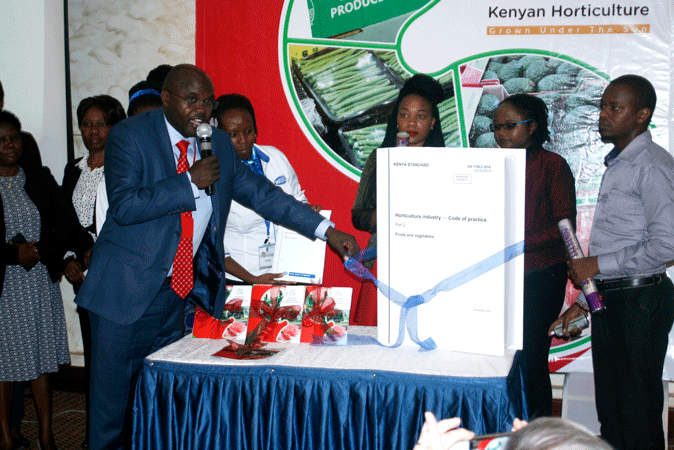
KHC launched to address matters on fruits and vegetables
Themed to be a one billion industry, the horticulture industry marked important milestone on July 21st, 2017 following the launch of the Kenya Horticultural Council (KHC).
The Kenya Horticultural Council is an umbrella body bringing together leading horticultural associations in Kenya; namely the Kenya Flower Council (KFC), the Fresh Produce Exporters Association of Kenya (FPEAK) and the Kenya Exporters of Fruits & Vegetables (KEFE).
The major objectives of the Council will be supporting the industry to comply with various international market standards and in the implementation of the horticulture standards for flowers and ornamentals as outlined in KS 1758 Part 2-fruits 7 vegetables
“The horticulture industry is facing existential threat from numerous interceptions at the market place occasioned by myriad of factors such as maximum residue levels (MRLs), documentation, tariff barriers and non-tariff barriers. The time has come to have a single strong platform that addresses common issues affecting the industry,” said Jane Ngige Acting CEO of the Council.
The launch which took place in Nairobi was attended by relevant partners from government agencies; the Kenya Plant Health Inspectorate Service (KEPHIS, Kenya Bureau of Standards (KEBS), the Horticulture Crop Directorate (HCD) and KENTRADE. Also in attendance were growers, exporters, horticulture industry service providers, representative from National Potato Council of Kenya and Royal Flora Holland. Others includes development partners; representatives from the embassy of the Royal Kingdom of the Netherlands-Nairobi and the German Chamber of Commerce and Industry and the European Union. The event was also graced by the USAID’s Kenya Agricultural Value Chain Enterprises Project Director Steve New.
Speaking while handing over the standards and its quality management system, Kenya Bureau of Standards (KEBS) Quality Assurance and Inspection Director Mr. Eric Chesire revealed that these standards will provide a common reference point for the assessment of quality goods and services, products and services are safe, reliable and of good quality.
“They are strategic tools for business, they reduce costs by minimizing waste and errors thus increasing productivity. They further help companies to access new markets, level the playing field for developing countries and facilitate free and fair global trade,” Chesire said
On her part, Grace Kyallo from Horticultural Crop Directorate (HCD) averred that the industry had witnessed an estimated annual growth of 10-15% of fruits and vegetables produced, totaling to eight million tons. “This increase saw the industry receive one billion shillings from the sale of these produce,” she noted.
As the industry adopts the standards, it will have to tackle packaging and product presentation that has proved to be a challenge in the export market.

